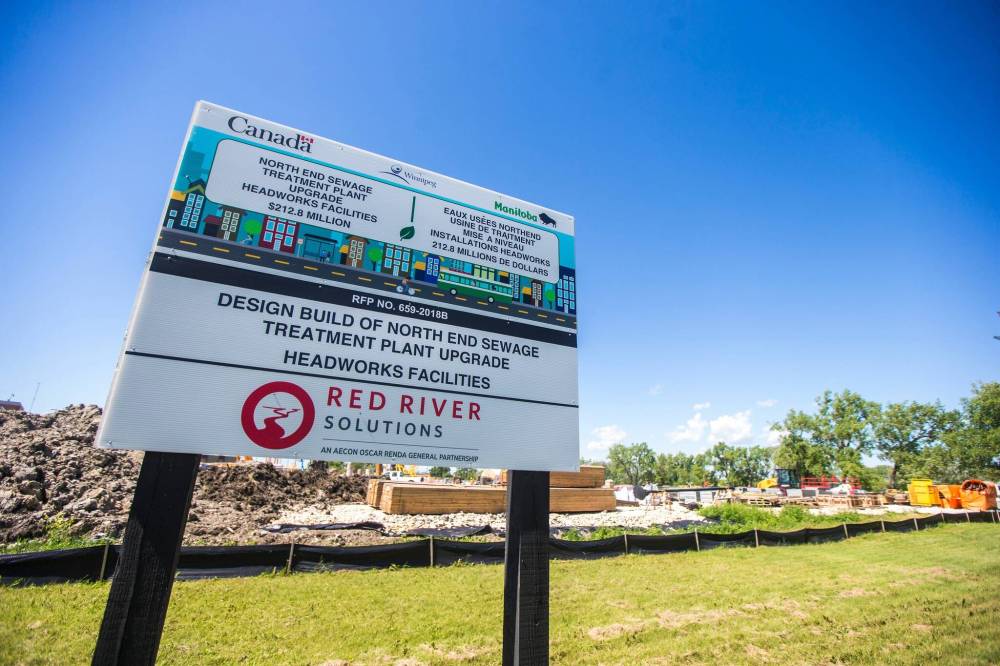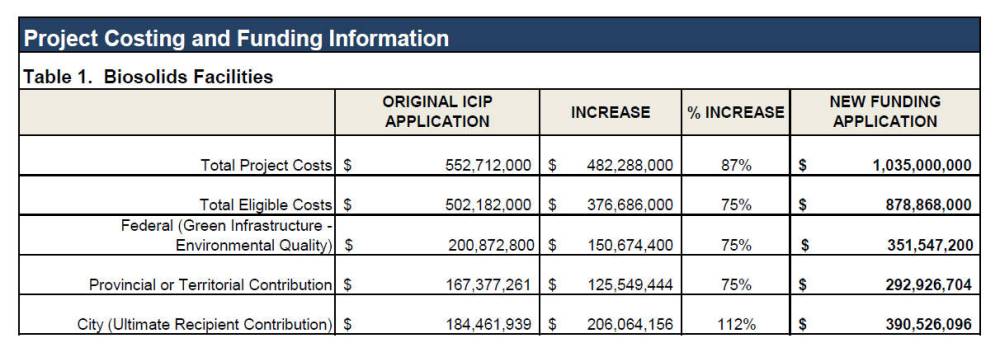North end sewage upgrade hit with expected $482-M price hike
Advertisement
Read this article for free:
or
Already have an account? Log in here »
To continue reading, please subscribe:
Monthly Digital Subscription
$0 for the first 4 weeks*
- Enjoy unlimited reading on winnipegfreepress.com
- Read the E-Edition, our digital replica newspaper
- Access News Break, our award-winning app
- Play interactive puzzles
*No charge for 4 weeks then price increases to the regular rate of $19.00 plus GST every four weeks. Offer available to new and qualified returning subscribers only. Cancel any time.
Monthly Digital Subscription
$4.75/week*
- Enjoy unlimited reading on winnipegfreepress.com
- Read the E-Edition, our digital replica newspaper
- Access News Break, our award-winning app
- Play interactive puzzles
*Billed as $19 plus GST every four weeks. Cancel any time.
To continue reading, please subscribe:
Add Free Press access to your Brandon Sun subscription for only an additional
$1 for the first 4 weeks*
*Your next subscription payment will increase by $1.00 and you will be charged $16.99 plus GST for four weeks. After four weeks, your payment will increase to $23.99 plus GST every four weeks.
Read unlimited articles for free today:
or
Already have an account? Log in here »
Hey there, time traveller!
This article was published 01/09/2023 (793 days ago), so information in it may no longer be current.
The cost of the City of Winnipeg’s north end sewage treatment upgrade is expected to soar by nearly a half-billion dollars, bringing the tab for the entire project to $2.336 billion.
The bill for the biosolids facilities project (the second part of the three-phase plan) is expected to jump about $482.3 million, to reach $1.035 billion — nearly doubling the previously approved price of $552.7 million for that single phase of the work, if city council approves.
“Unfortunately, I am not surprised (by the increase)… It seems that all city projects are seeing cost increases related to several things, including the inflationary crisis on construction, labour costs, supply chain issues,” said Mayor Scott Gillingham.

MIKAELA MACKENZIE / WINNIPEG FREE PRESS FILES
The price hike makes it the most expensive infrastructure project in Winnipeg’s history.
Gillingham planned to send a letter Friday to the provincial and federal governments, asking them to help cover the extra projected costs.
The three governments signed an agreement to fund the phase based on its previous $553-million price tag, through which the feds would cover 36 per cent, the province would pay 30 per cent, and the city would fund the rest.
“I’m hoping they will continue on with the ICIP funding formula (portions) that they originally agreed to,” said Gillingham.
The overall north end sewage treatment plant upgrade will greatly increase sewage treatment capacity and substantially reduce the amount of algae-promoting nutrients leaving the plant and polluting waterways.
The added budget for Phase 2 will include some pollution reduction.
“We need to complete the north end treatment plant upgrades for three main reasons: one is because we have aging infrastructure, (the) second is because we need to expand to allow growth in the City of Winnipeg… and (the) third (is) to meet provincial regulatory (environmental) requirements. And, so, this project has got to be done,” said Gillingham.
The price hike makes it the most expensive infrastructure project in Winnipeg’s history.
Council was warned last year the biosolids phase was at risk of a $360-million cost hike, due to project delays, inflation/market changes and an expanded scope. The report says a more precise, recent estimate found the cost will push it even higher, largely due to increased construction and interest costs.
The staff report suggests the overrun be covered solely by the city, using reserves, user fees, retained earnings and debt. About $351 million would come from additional borrowing under that plan, starting in 2026.
Coun. Brian Mayes, chairman of the water and waste committee, said Winnipeg must instead push for a prompt senior government funding commitment to cover the cost hike.
“We can’t wait around for a couple of years and then negotiate, then the cost will run away from us even more,” said Mayes.
He fears a city vote to cover the full bill would set a precedent for other cost-shared projects, leading the city to repeatedly pay more than it can afford.
Mayes said he expects the price hike itself will be approved, since there’s a pressing need to complete the project. “We need this structure to update our infrastructure. We need it to accommodate growth.”
Water and waste officials have warned the city must increase its biosolids treatment capacity within five to nine years, or it could be forced to halt or restrict new development.

(City of Winnipeg)
“Failure to amend the budget will impact the public service’s ability to deliver the critical biosolids upgrade. This would limit growth and development within Winnipeg and the metro region, and result in a failure to comply with the (plant’s) environment act licence,” wrote Cynthia Wiebe, water and waste’s manager of engineering services, in the report.
Construction of the facility alone is expected to take about five years.
Mayes said he understands the new price tag may trigger sticker shock among Winnipeggers, since the entire north end sewage upgrade was once expected to cost $795 million, less than the revised price for this phase of work.
However, he warned further delay will likely only add more costs. “Let’s just get this thing going… We need to do this.”
The report notes the new price tag would be expected to raise water and sewer utility rates, if the city alone covers it. A chart suggests the annual bill could reach $1,671 for the average household in 2033, based on the initial budget for the project, but would reach $2,004 if the city alone covers the price increase.
The chart suggests rates would reach $1,812 per year if the feds and province each cover about one-third of the revised cost — though the city cautions the third phase of the upgrade is not factored in.
Mayes said he’s still seeking more information on those estimates.
In an email, a provincial spokesperson said the province can’t announce any new funding, due to rules surrounding the upcoming election, and noted Manitoba previously committed more than $320 million to support the treatment plant upgrade.
Council’s water and waste committee will vote on cost hike Sept. 8. It would also require full council approval.
joyanne.pursaga@freepress.mb.ca
Twitter: @joyanne_pursaga

Joyanne is city hall reporter for the Winnipeg Free Press. A reporter since 2004, she began covering politics exclusively in 2012, writing on city hall and the Manitoba Legislature for the Winnipeg Sun before joining the Free Press in early 2020. Read more about Joyanne.
Every piece of reporting Joyanne produces is reviewed by an editing team before it is posted online or published in print — part of the Free Press‘s tradition, since 1872, of producing reliable independent journalism. Read more about Free Press’s history and mandate, and learn how our newsroom operates.
Our newsroom depends on a growing audience of readers to power our journalism. If you are not a paid reader, please consider becoming a subscriber.
Our newsroom depends on its audience of readers to power our journalism. Thank you for your support.




